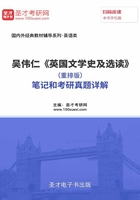
1.2 考研真题与典型题详解
I. Fill in the blanks.
1.Beowulf probably existed in its oral form as early as the ______ century and its hero and his adventures are placed in ______ and southern Sweden rather than in England. (国际关系学院2010研)
【答案】6th; Denmark
【解析】《贝奥武甫》最早在公元6世纪开始口头传诵,故事发生在丹麦和瑞典南部,诗中并没有提及英国。
2.In the 8th century, Anglo-Saxon prose appeared. The famous prose writers of that period were Venerable Bede and ______.
【答案】Alfred the Great
【解析】阿尔弗雷德大帝和比德是盎格鲁-撒克逊时期的散文家。
3.The literature of the Anglo-Saxon period falls naturally into two divisions, ______ and Christian.
【答案】pagan
【解析】盎格鲁-撒克逊时期的英国文学主要是异教诗和基督教文学两类。
4.Angles, Saxons and ______ usually known as Anglo-Saxons are the first Englishmen. Language spoken by them is called ______, which is the foundation of English language and literature.
【答案】Jutes; the Old English
【解析】盎格鲁-撒克逊人通常指盎格鲁人、撒克逊人、朱特人三个部族,他们的语言是古英语。
5.The ______ period witnessed a transition from tribal society to feudalism.
【答案】Anglo-Saxon
【解析】盎格鲁-撒克逊时期,英国由部落社会步入封建社会。
6.The early inhabitants on the island now we call England were ______, a tribe of Celts. From the Britons the island got its name of Britain, the land of Britons. The Britons were a ______ people.
【答案】Britons; primitive
【解析】作为凯尔特一个部族的不列颠人是英格兰的早期定居者,不列颠岛也因此而得名。
II. Multiple Choices
1.The history of English literature begins in the ______ century. (北二外2009研)
A. 7th
B. 6th
C. 5th
D. 4th
【答案】C
【解析】英国文学始于盎格鲁-撒克逊人定居英国,即公元450年,所以是5世纪。
2.The Anglo-Saxons were Christianized in the ______ century.
A. 5th
B. 6th
C. 7th
D. 8th
【答案】C
【解析】盎格鲁-撒克逊人在公元7世纪被基督教化了。
3.Beowulf describes the exploits of a ______ hero, Beowulf, in fighting against the monster Grendel, his revengeful mother, and a fire-breathing dragon.
A. Danish
B. Scandinavian
C. English
D. Norwegian
【答案】B
【解析】《贝奥武甫》讲述的故事发生在北欧斯堪的纳维亚半岛。歌颂了主人公贝奥武夫先后战胜巨怪Grendel,Grendel的母亲以及火蛇的英勇事迹。
4.The most important work of Alfred the Great is ______, which is regarded as the best monument of the old English prose.
A. The Song of Beowulf
B. The Anglo-Saxon Chronicles
C. The Ecclesiastical History of the English People
D. Brut
【答案】B
【解析】阿尔弗雷德大帝的代表作是《盎格鲁-撒克逊编年史》;《贝尔武甫》是英国流传下来的最古老的史诗。
III. Explain the following terms.
1.Old English period (the Anglo-Saxon period)
Key: Old English period (the Anglo- Saxon period): ①The Old English period, extended from the invasion of Celtic England by Germanic tribes (the Angles, Saxons, and Jutes) in the first half of the fifth century to the conquest of England in 1066 by the Norman French under the leadership of William the Conqueror. ②Only after they had been converted to Christianity in the seventh century did the Anglo-Saxons, whose earlier literature had been oral, begin to develop a written literature.
2.Alliteration (南开大学2010研)
Key: ①Alliteration, also known as “head rhyme” or “initial rhyme”, refers to the repetition of the same sounds--usually initial consonants of words or of stressed syllables--in any sequence of neighboring words. ②Now an optional and incidental decorative effect in verse or prose, it was once a required element in the poetry of Germanic languages (including Old English and Old Norse) and in Celtic verse. ③Such poetry, in which alliteration rather than rhyme is the chief principle of repetition, is known as alliteration verse; its rules also allow a vowel sound to alliterate with any other vowels.
3.epic (天津外国语学院2007研;厦门大学2008研)
Key: epic: It is, originally, an oral narrative poem, majestic both in theme and style. Epics deal with legendary or historical events of national or universal significance, involving actions of broad sweep and grandeur. Most epics deal with the exploits of a single individual, thereby giving unity to the composition. Great epics include Iliad and Odyssey by Homer.
IV. Short answer questions
1.What are the main characteristics of Anglo-Saxon literature?
Key: Anglo-Saxon literature is almost exclusively a verse literature in oral form. It was passed down by word of mouth from generation to generation. Most of its creators are unknown. There are two groups of English poetry in Anglo-Saxon period. The first group is the pagan poetry represented by Beowulf, and the second is the religious poetry represented by the works of Caedmon and Cynewulf.
2.What are the artistic features of Old English poetry?
Key: (1) The use of alliteration. Each full line has four stresses with a number of unstressed syllables, three of which begin with the same sound or letter.
(2) The use of strong stress and the predominance of consonants. Almost all this poetry is composed without rhyme. Each line is divided into two halves and each half has two heavy stresses.
(3) The use of vivid poetic diction and parallel expressions for a single idea, such as the sea is called “swan-road” or “whale-path”, a soldier is called “shield-bearer”, “battle-hero” or “spear-fighter”, etc.
V. Essay question
What are the three parts told in the story of Beowulf? How is heroic ideal reflected in Beowulf?
Key: (1) Structurally speaking, Beowulf is built around three fights. The first part deals with the fight between Beowulf and the monster Grendel that has been attacking the great hall of Heorot, built by Hrothgar, the Danish King. The second part involves a battle between Beowulf and Grendel’s mother, a water-monster, who takes revenge by carrying off one of the king’s noblemen. The last part is about the fight between Beowulf and a firedrake that ravages Beowulf’s kingdom.
(2) Beowulf is a pagan poem concerned with the heroic ideal of kings and kingship in North Europe. Battle is a way of life at that time. Strength and courage are basic virtues for both kings and his warriors. The king should protect his people and show gentleness and generosity to his warriors. And in return, his warriors should show absolute obedience and loyalty to the king. By praising Beowulf’s wisdom, strength and courage, and by glorifying his death for his people, the poem presents the heroic ideal of a king and his good relations to his warriors and people.